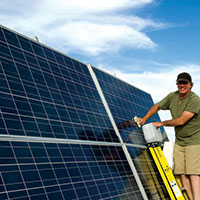Green Your Crib: To Clean or Not to Clean

I am sometimes asked, “Do I need to clean my solar panels?” The answer is not straightforward. Photovoltaic solar panels produce electric power from the photons of sunlight that strike the panel surface. The cleaner the surface, usually a protective glass layer, the higher the power output. The crystalline cell technology in the panels degrades about one percent per year.
A 2010 study done at the University of California, San Diego, concluded that cleaning solar panels is often not worth the cost. It evaluated 186 residential systems located between San Francisco and San Diego. The study only covered the dry months of the year. It found that panels that hadn’t been cleaned or rained on for 145 days during the dry season lost 7.4 percent of their efficiency. For the typical residential solar system of five kilowatts, washing the panels halfway through the summer would translate into a mere $20 gain in electrical production until the end of the summer drought, a few months later. One wouldn’t recoup the money spent, especially if a professional were hired for the cleaning.
Pollution, traffic dust, mold, leaves, and bird droppings all contribute to reducing the sunlight that reaches a panel’s solar cells. Rain is a great panel cleaner but does little against mold, bird droppings, or encrusted crud. According to the National Renewable Energy Laboratory, uncleaned panels lose up to 25 percent of their productive potential. In my view, the time frame of the UC San Diego study is too short to be definitive. Any tenacious dirt that is not removed by rain or washing will hinder performance, not just for the next three months (as per the study), but for years, until eliminated by cleaning.
Researchers have found that solar panels mounted at an angle of less than five degrees lead to bigger losses in efficacy. That’s because dirt tends to slip off panels that are installed at a steeper pitch.
My experience leads me to think that cleaning panels once a year is appropriate, especially if you tackle the task yourself. Wash panels early or late while they are still cool. Dry the panels with a long-handled squeegee or polishing cloth as soon as possible after washing to prevent water from drying on the glass and leaving a residual calcium deposit. This is the reason to avoid cleaning when the panels are hot during the middle hours of the day. Use a soft bristle brush; a scourer may damage the surface as may using cleaning chemicals. If hiring a cleaning firm, make sure it carries insurance and that the workers have proper safety gear. And of course it’s always advisable to get multiple quotes so that you know you are getting a competitive price.



